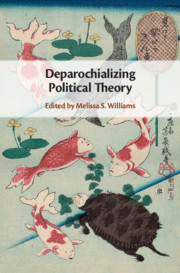Book contents
- Deparochializing Political Theory
- Deparochializing Political Theory
- Copyright page
- Dedication
- Contents
- Tables
- Contributors
- Preface and Acknowledgments
- Note on the Text
- 1 Introduction
- 2 Deparochializing Political Theory and Beyond
- 3 Recentering Political Theory, Revisited
- 4 A Decentralized Republic of Virtue
- 5 Deparochializing Political Theory from the Far Eastern Province
- 6 Is Popular Sovereignty a Useful Myth?
- 7 Authoritarian and Democratic Pathways to Meritocracy in China
- 8 Deparochializing Democratic Theory
- 9 Teaching Comparative Political Thought
- 10 Teaching Philosophy and Political Thought in Southeast Asia
- 11 Why Globalize the Curriculum?
- Index
6 - Is Popular Sovereignty a Useful Myth?
Published online by Cambridge University Press: 15 March 2020
- Deparochializing Political Theory
- Deparochializing Political Theory
- Copyright page
- Dedication
- Contents
- Tables
- Contributors
- Preface and Acknowledgments
- Note on the Text
- 1 Introduction
- 2 Deparochializing Political Theory and Beyond
- 3 Recentering Political Theory, Revisited
- 4 A Decentralized Republic of Virtue
- 5 Deparochializing Political Theory from the Far Eastern Province
- 6 Is Popular Sovereignty a Useful Myth?
- 7 Authoritarian and Democratic Pathways to Meritocracy in China
- 8 Deparochializing Democratic Theory
- 9 Teaching Comparative Political Thought
- 10 Teaching Philosophy and Political Thought in Southeast Asia
- 11 Why Globalize the Curriculum?
- Index
Summary
Joseph Chan and Franz Mang deploy analytic methods to elucidate Confucian political philosophy and ethics for the twenty-first century, arguing that Confucian ideals offer a pathway toward overcoming modern thought’s neglect of the cultivation of ethical character as constitutive of the life well lived – an idea common to ancient thought in both Western and East Asian contexts. In this chapter, they accept a key challenge of deparochializing political theory: that it forces us out of our intellectual comfort zones to engage with traditions that are new to us. In this spirit, they construct a conversation between Western political thought, Confucianism, and Islam on the idea of popular sovereignty. They develop reconstructive-analytic accounts of mainstream Confucian and Islamic political thought and argue that neither tradition can be reconciled at a philosophical level with the idea of the people as the ultimate source of legitimate political authority. Even though strands of both Confucianism and Islam are compatible with democracy, popular sovereignty cannot serve as a “useful myth” in Confucian- or Islamic-heritage societies, for different reasons. These societies can benefit from projects of democratization and civil liberties but can dispense with the doctrine of popular sovereignty as the foundation for such projects.
Keywords
Information
- Type
- Chapter
- Information
- Deparochializing Political Theory , pp. 149 - 173Publisher: Cambridge University PressPrint publication year: 2020
Accessibility standard: Unknown
Why this information is here
This section outlines the accessibility features of this content - including support for screen readers, full keyboard navigation and high-contrast display options. This may not be relevant for you.Accessibility Information
- 3
- Cited by
